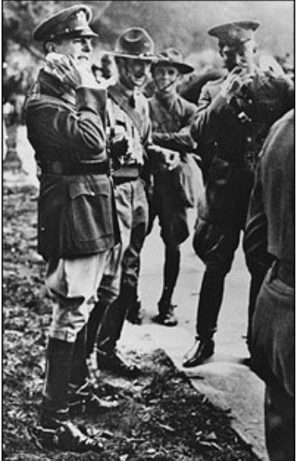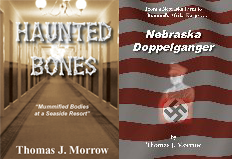Tom Morrow’s ‘Historically Speaking’
June 17, 2018
March of the Bonus Army
by Tom Morrow
The burning of Washington, D.C., by the British Army during the War of 1812, wasn’t the only time our nation’s capital city was invaded. It happened the spring and summer of 1932, when some 17,000 World War I veterans marched on the city, demanding a cash redemption of their bonus certificates, which had been issued to World War I veterans.
With their families, a total of 43,000 set up a make-shift encampments of tents and temporary shacks, resolving not to leave until the government made good on a 1924 “World War Adjusted Compensation Act.” The money wasn’t supposed to be paid until 1945, but crushing economic pressures of the Great Depression pushed the out-of-work veterans to demand the money early.
Organizers called it the “Bonus Expeditionary Force Marchers,” but the media called it the “Bonus Army.”

The U.S. Attorney General ordered the veterans removed from all government property. When the veterans resisted, shots were fired and two were killed. President Herbert Hoover then ordered the Army to clear the veterans’ campsite.
Army Chief of Staff, Gen. Douglas MacArthur, commanded the infantry and cavalry units, which was supported by six tanks. The tanks were commanded by Maj. George S. Patton. The Bonus Marchers, believing the troops were marching in their honor, cheered the troops until Patton ordered the cavalry to charge them — an action which prompted the spectators to yell, “Shame! Shame!”
The Bonus Army marchers with their wives and children were driven out, and their shelters burned. The veterans fled across the Anacostia River to their largest camp, known as “Hooverville,” when President Hoover ordered the assault stopped. However MacArthur, feeling the Bonus March was an attempt to overthrow the U.S. government, ignored the President and ordered a new attack. Fifty-five veterans were injured and 135 arrested.
Maj. Dwight D. Eisenhower, later our 34th President, served as one of MacArthur’s junior aides. Believing it wrong for the Army’s highest-ranking officer to lead an action against fellow veterans, Ike strongly advised MacArthur against taking any public role: “I told that dumb son-of-a-bitch not to go down there,” he said later.
A decorated hero from the war, who had saved Patton’s life during the war, approached him the day after the Army’s action to sway him. Rather than listen to the man whom Patton had personally decorated for his bravery under fire, was coldly rejected, saying “I do not know this man.”
The Bonus Army incident proved disastrous for Hoover’s chances at re-election; he lost the 1932 election in a landslide to Franklin D. Roosevelt.
In May 1933, a second demonstration was organized. Roosevelt provided the marchers with a campsite in Virginia, with three meals a day. Roosevelt arranged for his wife Eleanor to visit the site unaccompanied, but the most she could offer was a promise of jobs in the newly created Civilian Conservation Corps. One veteran commented: “Hoover sent the army, Roosevelt sent his wife.”
In 1936, at the height of the Depression, Congress overrode President Franklin D. Roosevelt’s veto and paid the veterans their bonus years.

To Learn More about Tom Morrow, the author click here
E-mail Tom Morrow at: quotetaker@msn.com
All of Tom’s books are available on Amazon.com
(Published in OsideNews)



